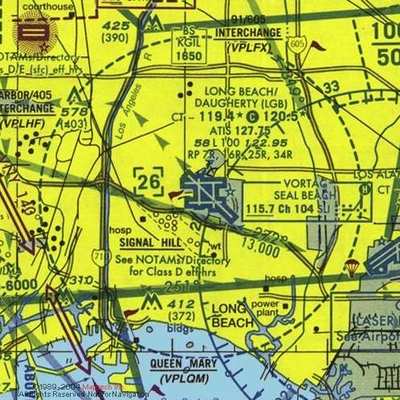Wed, Sep 08, 2010
FAA Wants To Expand Class C Airspace, Change Traffic
Patters
It's not often that GA pilots and residents living near airports
or in flight corridors find themselves on the same side of an
argument, but that's just what seems to be happening with the FAA's
plan to nearly triple the size of the Class C airspace around Long
Beach Airport.

Expanding the Class C airspace would bring a large portion of
the so-called South Bay area under positive control, requiring
pilots to work with San Diego center. Pilots say the action will
push such activities as flight training to uncontrolled airspace
over residential neighborhoods of the Palos Verdes Peninsula, a
move sure to be protested by the people living in those
neighborhoods.
The FAA says the Class C expansion will reduce the risk of
collision between GA aircraft and Long Beach jet traffic. But
critics predict that the move will simply cause student pilots to
avoid the Class C airspace all together, pushing them into a narrow
corridor between KLAX and San Pedro. They also say the new Class C
would overlap flight training areas over Los Angeles and Long
Beach Harbors, making them "useless."
The Daily Breeze reports that the FAA says the move was
triggered by an increase in near-collision alerts in the Long Beach
area, though one aviation consultant who worked for the FAA for
three decades said there is no empirical data to back up that
claim. Long Beach Airport is limited to 41 commercial flights per
day. FAA Lynn Lunsford said that the commercial flights must climb
through airspace that is "congested" with GA airplanes operating
VFR. "Smaller aircraft, VFR aircraft not talking to air traffic
controllers, they tend to sort of gravitate toward this ...
airspace because they don't have to talk to controllers," she said.
"We have to provide separation. The goal is to reduce jets'
exposure to untracked VFR traffic."

Flight instructors say they have enough to do while working with
a student without having to worry about staying in touch with
ATC. They also say the move restricts options for emergency
landings in an area that will see a marked increase in
inexperienced pilots. One instructor said a par 5 hole at Trump
National Golf Course would be the best option for a emergency
landing. Residents now living in the affluent neighborhoods under
what would be the remaining uncontrolled airspace say they don't
want the increase in air traffic and noise that the change is
likely to bring.
The California Pilots Association and AOPA have both weighed in
as well, saying they oppose the FAA's "piecemeal" approach to the
Los Angeles area's complex airspace, and that the agency should
look for an overall solution to how the airspace is allocated.
More News
Aero Linx: International Federation of Airworthiness (IFA) We aim to be the most internationally respected independent authority on the subject of Airworthiness. IFA uniquely combi>[...]
Ultrahigh Frequency (UHF) The frequency band between 300 and 3,000 MHz. The bank of radio frequencies used for military air/ground voice communications. In some instances this may >[...]
A Few Questions AND Answers To Help You Get MORE Out of ANN! 1) I forgot my password. How do I find it? 1) Easy... click here and give us your e-mail address--we'll send it to you >[...]
From 2019 (YouTube Edition): Learning To Paint Without Getting Any On Your Hands PPG's Aerospace Coatings Academy is a tool designed to teach everything one needs to know about all>[...]
Also: Sustainable Aircraft Test Put Aside, More Falcon 9 Ops, Wyoming ANG Rescue, Oreo Cookie Into Orbit Joby Aviation has reason to celebrate, recently completing its first full t>[...]
 ANN's Daily Aero-Linx (05.06.25)
ANN's Daily Aero-Linx (05.06.25) ANN's Daily Aero-Term (05.06.25): Ultrahigh Frequency (UHF)
ANN's Daily Aero-Term (05.06.25): Ultrahigh Frequency (UHF) ANN FAQ: Q&A 101
ANN FAQ: Q&A 101 Classic Aero-TV: Virtual Reality Painting--PPG Leverages Technology for Training
Classic Aero-TV: Virtual Reality Painting--PPG Leverages Technology for Training Airborne 05.02.25: Joby Crewed Milestone, Diamond Club, Canadian Pilot Insurance
Airborne 05.02.25: Joby Crewed Milestone, Diamond Club, Canadian Pilot Insurance




